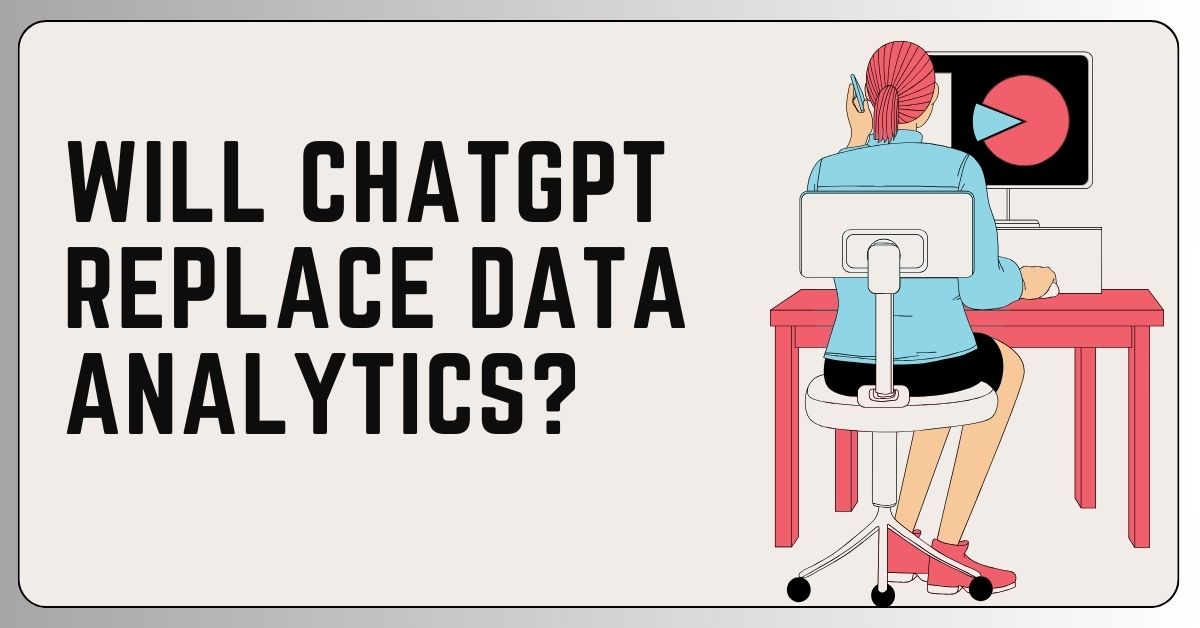
Data analytics has become an increasingly important field in recent years. Companies and organizations rely on data to make informed decisions and improve operations.
Advances in artificial intelligence and natural language processing have led to the development of powerful language models such as ChatGPT. As a data analyst, it’s only natural for you to worry whether or not ChatGPT can replace you in certain applications.
This discussion will cover the potential impact of ChatGPT on the future of data analytics and answer the big “Will ChatGPT replace data analytics” question.
What Is the Future of ChatGPT in Data Analytics?
ChatGPT is a powerful language model that has shown immense potential in data analytics. As natural language processing and artificial intelligence evolve, we can expect to see even more innovative uses of ChatGPT in data analytics.
Below are some potential developments and arguments on the future of ChatGPT in data analytics.
Improved Natural Language Processing
ChatGPT has already shown impressive results in natural language processing applications such as sentiment analysis and translation. As the technology continues to improve, we can expect ChatGPT to become even more accurate and efficient at processing and analyzing large volumes of unstructured text data.
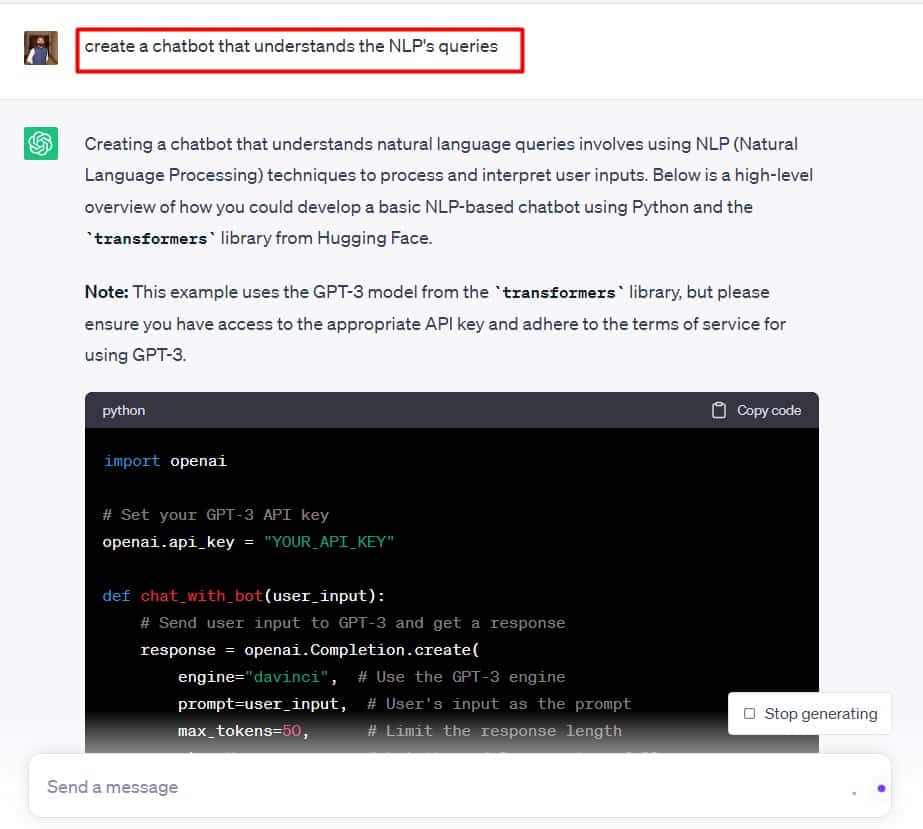
Enhanced Recommendation Systems
ChatGPT can improve recommendation systems by providing personalized recommendations based on individual users’ preferences and behavior. As ChatGPT becomes more advanced, it could even anticipate users’ needs and provide tailored recommendations before they know they need them.
Expanded Use Cases in Customer Support
As ChatGPT becomes more sophisticated, it could be used to provide more comprehensive and effective customer support. With the ability to understand and respond to natural language queries, ChatGPT could assist with a wider range of customer support inquiries, reducing the need for human intervention and improving response times.
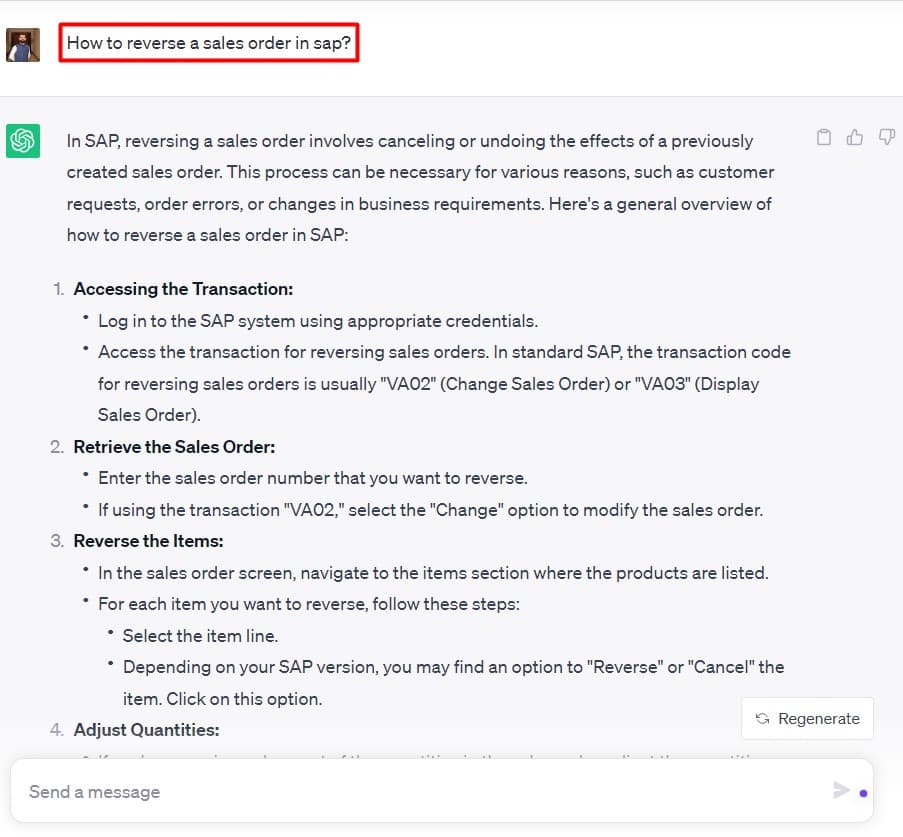
Integration With Data Analytics Tools
ChatGPT is just one of many powerful tools used in data analytics. As the technology continues to evolve, we can expect to see greater integration of ChatGPT with other data analytics tools and platforms.
Potential Ethical Implications
ChatGPT has become more advanced. There are potential ethical implications to consider. For example, there may be concerns around bias in the data used to train ChatGPT or around the potential for misuse of the technology in areas such as surveillance or privacy invasion.
It will be important for organizations and researchers to consider these issues as they continue to develop and deploy ChatGPT in data analytics applications.
Is ChatGPT a Threat to Jobs in Data and Analytics?
There are concerns that ChatGPT and other advanced AI technologies could replace jobs in data and analytics. While ChatGPT and other advanced AI technologies have the potential to automate some routine data analysis tasks, it is not necessarily a threat to jobs in data and analytics.
ChatGPT is a powerful tool that can assist human analysts in processing and analyzing large volumes of unstructured data. But, it cannot replace human analysts’ creativity, intuition, and critical thinking skills.
ChatGPT has the potential to create new job opportunities for data scientists and analysts to work alongside the technology and interpret its output. Additionally, individuals must develop and maintain ChatGPT systems and other AI technologies.
Therefore, while ChatGPT may change the nature of some jobs in data and analytics, it is not necessarily a threat to the entire profession. Individuals in the field need to adapt and develop the necessary skills to work alongside these technologies and maximize their benefits.
What Are the Best Use Cases of ChatGPT in Data Analytics?
ChatGPT has numerous use cases in data analytics, from natural language processing to predictive analytics. With its natural language interface, ChatGPT allows users to interact with data conversationally, eliminating the need for complex queries or programming skills.
Here are some of the best use cases of ChatGPT in data analytics.
Natural Language Processing
ChatGPT’s ability to understand and process natural language makes it a powerful tool for natural language processing (NLP). Some examples of how you can use ChatGPT in NLP.
- Sentiment Analysis: ChatGPT can analyze customer reviews, feedback, and social media posts to determine sentiment and identify trends.
- Chatbots and Virtual Assistants: ChatGPT can create chatbots and virtual assistants that can understand and respond to natural language queries and requests.
- Summarization: ChatGPT can summarize large volumes of text data, such as news articles or research papers.

Predictive Analytics
According to the Marketing AI Institute, AI helps predict business and marketing outcomes. ChatGPT’s ability to analyze large volumes of data and identify patterns and trends makes it a useful tool for predictive analytics. Here are some examples of how you can use ChatGPT in predictive analytics.
- Sales Forecasting: ChatGPT analyzes historical sales data and identifies trends to forecast future sales.
- Customer Behavior Prediction: ChatGPT analyzes customer data and predicts behavior, such as purchase patterns or likelihood to churn.
- Fraud Detection: ChatGPT analyzes transaction data and identifies patterns that may indicate fraudulent activity.
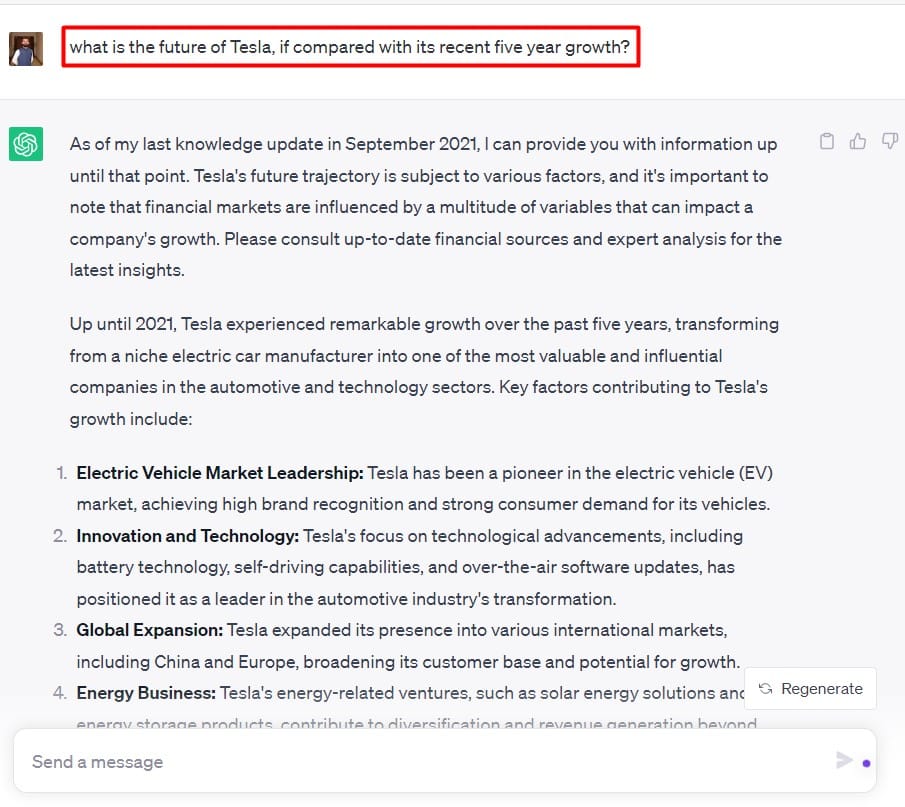
Data Analysis and Exploration
ChatGPT’s ability to process and analyze large volumes of unstructured data makes it a useful tool for data analysis and exploration. Here are some examples of using ChatGPT in data analysis and exploration.
- Data Cleaning and Preparation: ChatGPT automates routine tasks such as data cleaning and preparation, freeing time for human analysts to focus on more complex and creative work.
- Topic Modeling: ChatGPT identifies topics and themes in large volumes of unstructured text data, such as customer feedback or social media posts.
- Knowledge Management: ChatGPT creates knowledge management systems that can answer natural language queries from employees or customers.
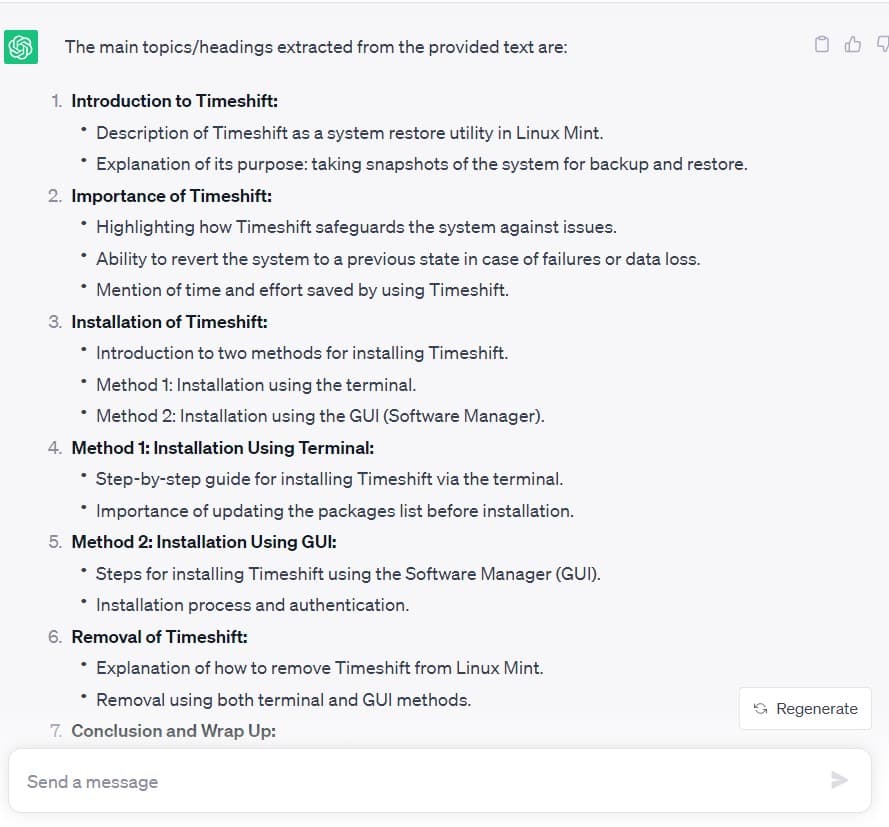
Decision Support
ChatGPT’s ability to provide insights and recommendations based on data analysis makes it a useful tool for decision support. Some examples of how ChatGPT can be used in decision support.
- Investment Analysis: ChatGPT can analyze financial data and provide insights and recommendations on investment opportunities.
- Supply Chain Optimization: ChatGPT can analyze supply chain data and provide insights and recommendations on optimizing the supply chain.
- Risk Management: ChatGPT can analyze data and identify potential risks, such as cybersecurity threats or financial fraud.
Why ChatGPT Will Never Replace Data Analytics?
While ChatGPT is a powerful tool for data analysis and natural language processing, it will never replace data analytics entirely. The overall scope of data analytics increases daily, requiring human effort. Thus, ChatGPT cannot be smart enough to generate ideas independently. Here are some of the top reasons why.
Limited Domain Knowledge
ChatGPT’s ability to process natural language and analyze data is limited to the knowledge it has been trained on. It may not have the domain-specific knowledge and expertise required to perform complex data analysis tasks in certain industries.
For example, a ChatGPT model trained on medical data may be unable to perform complex financial or marketing analysis tasks.
Lack of Contextual Understanding
ChatGPT models are designed to process and analyze text data based on patterns and associations. However, they may lack the contextual understanding to accurately interpret data and provide meaningful insights. This means that human analysts are still needed to provide context and interpret the insights generated by ChatGPT.
Limited Creativity and Innovation
While ChatGPT can analyze data and identify patterns, it may not have the creativity and innovation required to develop new and innovative data analysis methodologies.
Human analysts are still needed to develop new approaches to data analysis and explore new avenues of inquiry.
Dependence on Data Quality
ChatGPT models depend on the quality of the data they are trained on. If the data is biased, incomplete, or inaccurate, the insights generated by ChatGPT may be flawed or misleading.
Human analysts are needed to ensure the quality of the data used for analysis and to identify and address any biases or inaccuracies.
Human Oversight
ChatGPT can automate routine data analysis tasks, but it still requires human oversight to ensure the accuracy and relevance of the insights generated. Human analysts are needed to validate the insights generated by ChatGPT and to provide additional context and interpretation.
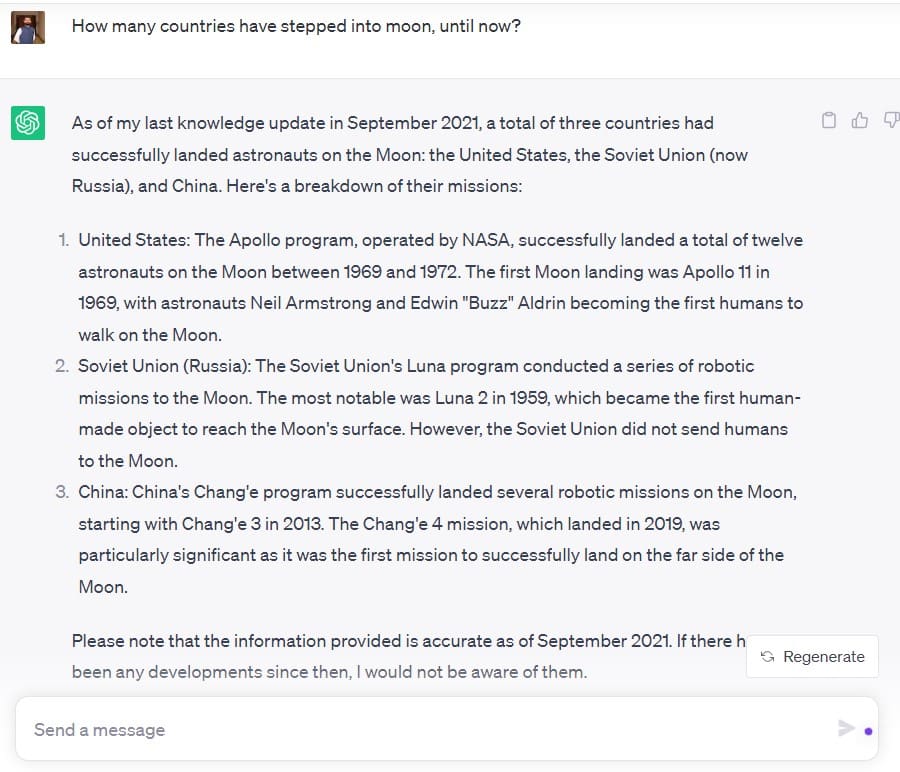
Ethical Considerations
ChatGPT and other AI technologies raise ethical considerations around data privacy, bias, and transparency. There’s a need for human analysts to ensure that the insights generated by ChatGPT are ethical and do not violate any ethical or legal guidelines.
What Areas Can ChatGPT Help and Replace Data Analysts?
ChatGPT cannot replace data analysts entirely as the new models/research are carried out by individuals whom ChatGPT is not trained yet. However, it can help automate routine data analysis tasks and streamline the process. Here are some key areas where ChatGPT can help and potentially replace data analysts.
Text Analysis
ChatGPT is particularly useful for analyzing large amounts of text data, such as customer feedback, social media posts, and email transcripts. It can analyze the text data’s sentiment, topics, and themes and provide valuable insights to help businesses improve customer satisfaction and product development.
For example, we have given text to ChatGPT to analyze what is being asked. The example text for analysis is shown as follows:
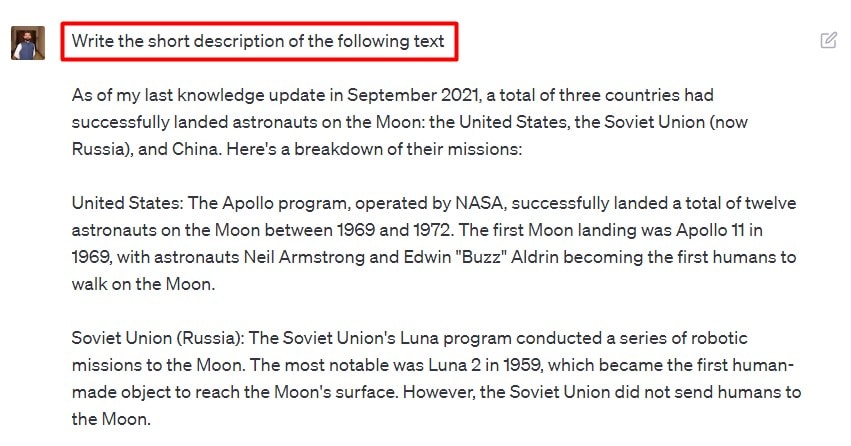
Language Translation
ChatGPT can translate text data from one language to another. This is particularly useful for businesses operating in multiple countries and needing to analyze data in different languages. For the translation of the text, you may write the language name with the text as follows:
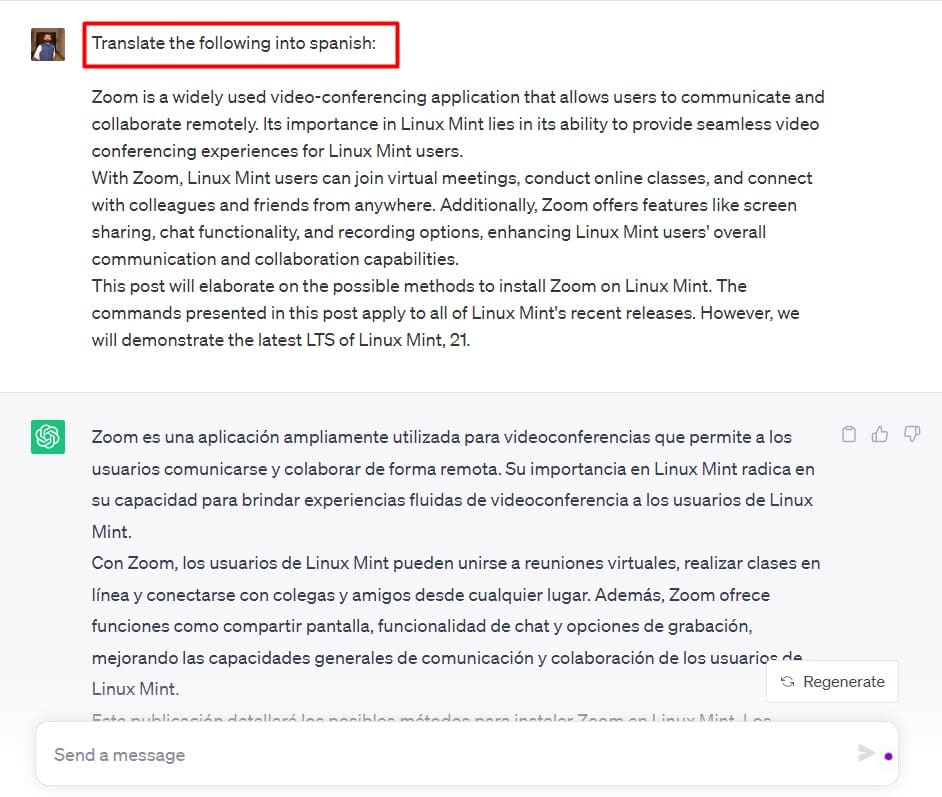
Data Cleaning and Preprocessing
ChatGPT can help automate data cleaning and preprocessing tasks, such as removing duplicates, filling in missing values, and standardizing data formats. This can save data analysts a significant amount of time and ensure that the data used for analysis is accurate and complete.
For instance, we provided the following text to ChatGPT and asked it to clean the write-up and remove the redundant and unnecessary sentences/words. The query we used is:
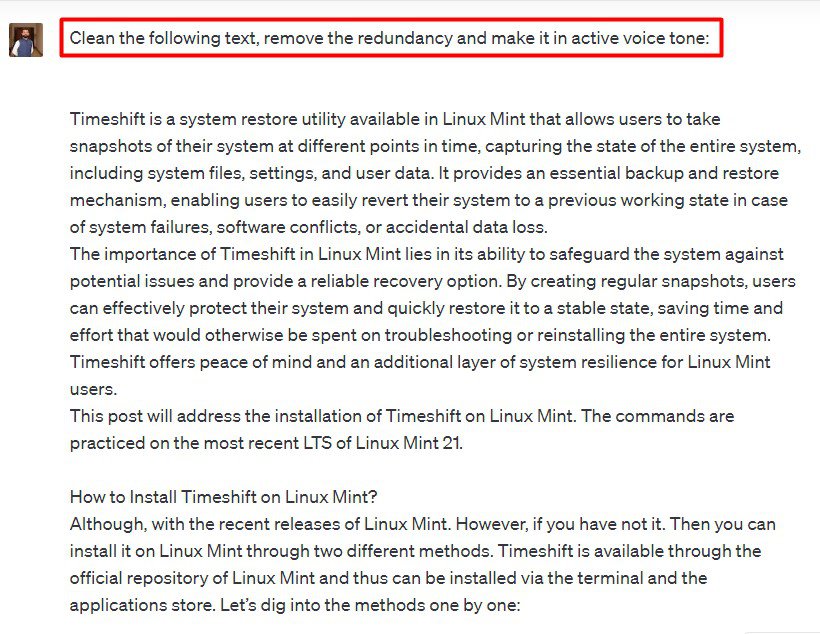
Predictive Analytics
ChatGPT can perform predictive analytics tasks, such as forecasting sales or predicting customer churn. It can analyze historical data and identify patterns and associations to predict future trends accurately.
First, we asked ChatGPT to give the information based on the history of USA cricket:

Then, used the same result to generate a predictive analysis of the ChatGPT, which is as follows:
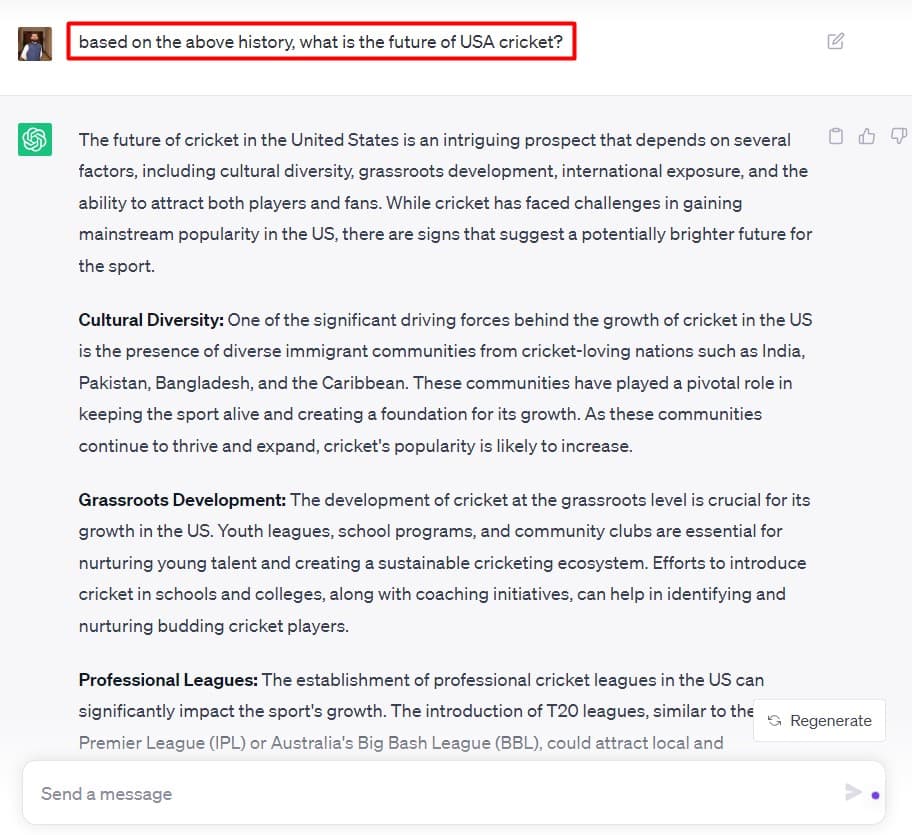
Data Visualization
ChatGPT can automate data visualization tasks, such as creating charts and graphs to represent data. This can help businesses easily understand their data and make more informed decisions.
Fraud Detection
ChatGPT can identify fraudulent activities in large datasets, like credit card transactions or insurance claims. It can analyze the data and identify patterns of fraudulent activity.
What Areas Will ChatGPT Struggle to Replace Data Analysts?
While ChatGPT can automate many routine data analysis tasks, there are several areas where it may struggle to replace data analysts completely. However, it is a fact that ChatGPT can never replace data analytics as a whole.
Here are some areas where ChatGPT will struggle to replace data analytics.
Complex Analysis
ChatGPT may struggle to perform complex data analysis tasks that require human expertise, such as developing complex statistical models, deep learning algorithms, or complex data mining techniques.
Data analysts often have the specialized knowledge and expertise to perform such complex analyses. The following query is used to generate a generic deep-learning algorithm to extract data:
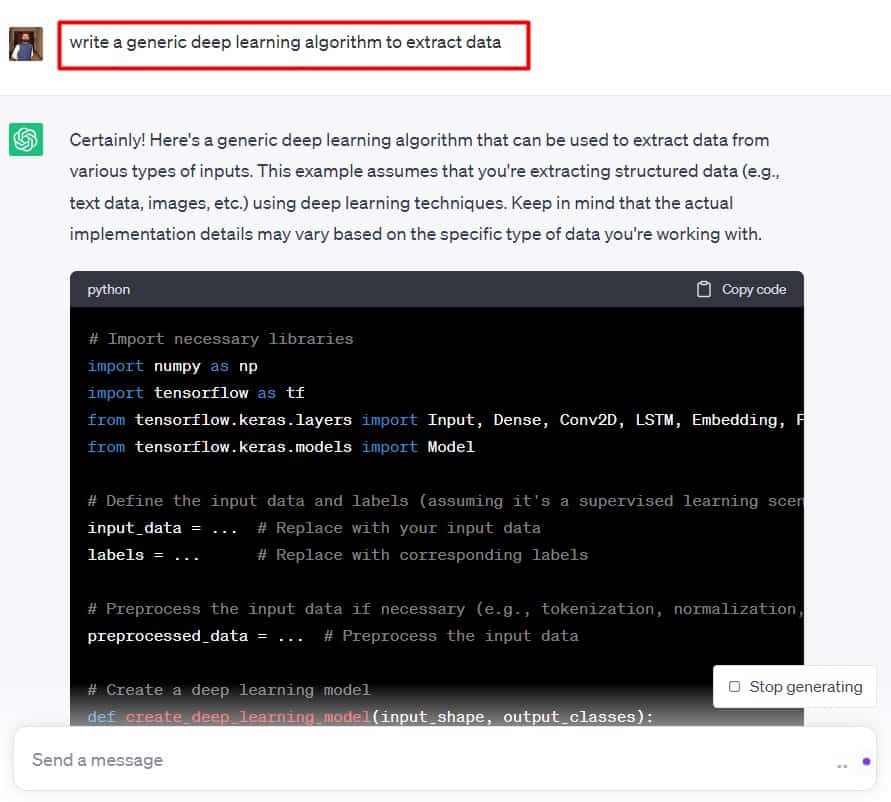
Data Exploration
ChatGPT may struggle to explore and analyze data interactively and iteratively. Data analysts often explore data exploratory, trying out different hypotheses and examining the results before moving on to more formal analysis. ChatGPT lacks the flexibility and creativity of human analysts and will give you limited way-outs.
Data Quality Assessment
ChatGPT may struggle to assess the quality of data used for analysis. ChatGPT lacks the human intuition to assess data quality and may provide inaccurate results if the data is of poor quality. Data analysts often examine data quality issues, such as missing data, inconsistent data, and outliers. The quality of a programming code assessed by the ChatGPT is shown below. Which has provided very generic terms:
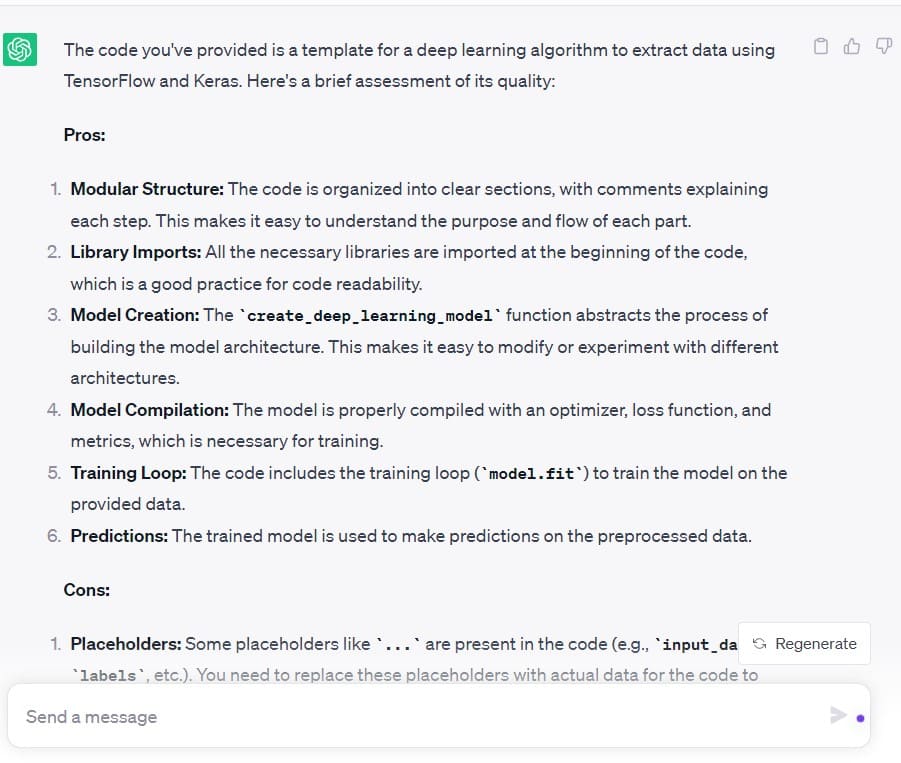
Business Domain Knowledge
ChatGPT may struggle to understand the business context and domain-specific knowledge required for accurate data analysis. Data analysts often have domain-specific knowledge necessary for understanding the nuances of the business problem and making accurate predictions. For instance, we asked ChatGPT to assess the quality of the code differently. It somehow summarized the same explanation.
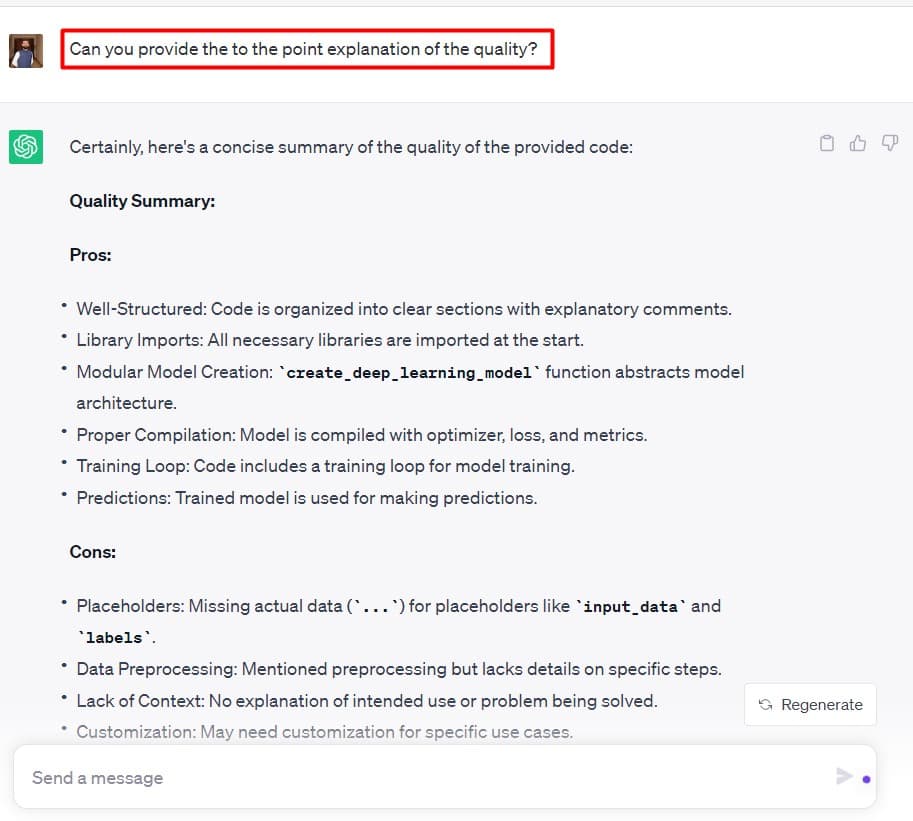
Communication Skills
ChatGPT may struggle to communicate the data analysis results to business stakeholders effectively. Data analysts often need to explain complex analysis results to non-technical stakeholders and provide recommendations for action.
ChatGPT may lack the human touch required for effective communication and may be unable to provide recommendations based on the specific context.
FAQs
Is ChatGPT Going to Replace Data Scientist Jobs?
While ChatGPT can automate many routine tasks in data analysis, it is unlikely to replace data scientists completely. Data scientists bring specialized knowledge and expertise to complex data analysis tasks requiring human intuition and creativity.
Will ChatGPT 4 Replace Data Analysts?
ChatGPT can automate many routine data analysis tasks, but it is unlikely to replace data analysts completely. Data analysts bring domain-specific knowledge and the ability to explore data in an interactive manner, which cannot fully replicate by ChatGPT.
Can ChatGPT Do a Predictive Analysis?
ChatGPT can perform predictive analysis using machine learning algorithms to learn from past data and predict future events.
However, the accuracy of the predictive analysis depends on the data quality and the analysis’s complexity, which may require human expertise.